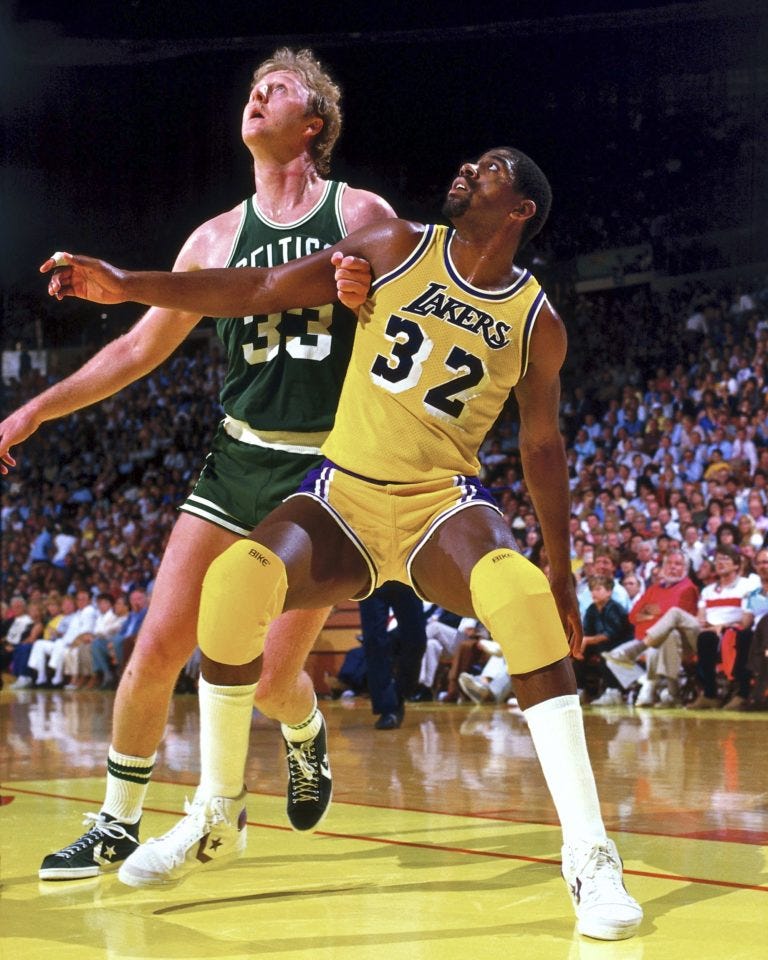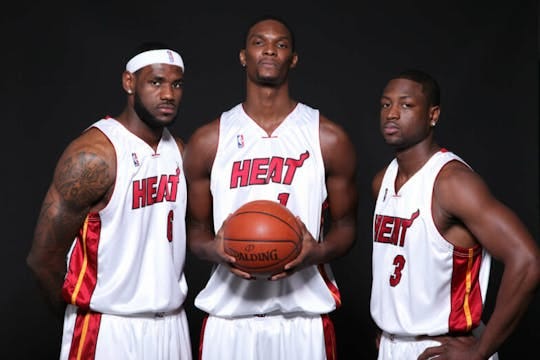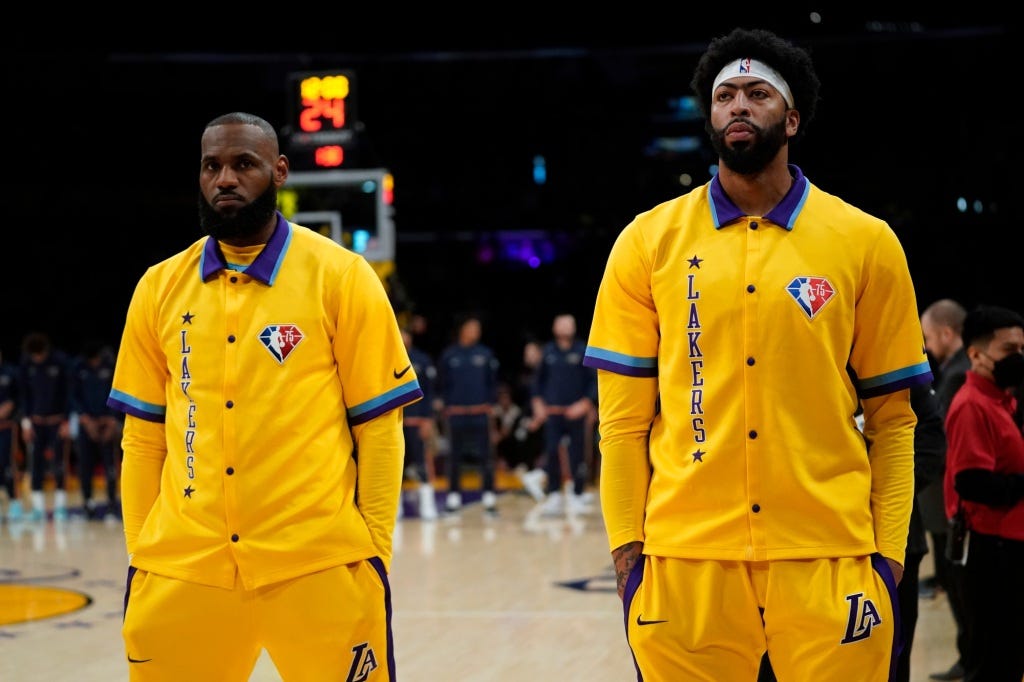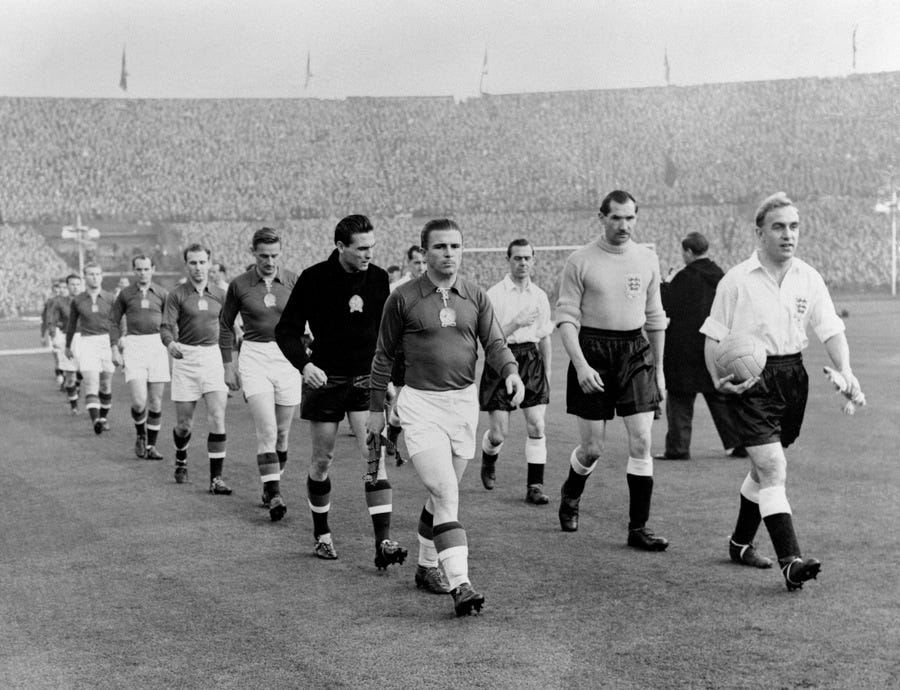The Death of the Superteam, the Rise of Collectivism
The era of the Superteam is passing. How can sports teams prepare themselves for the future, and how does it relate to an international football game played in 1953?
In 1953, socialist football came to England, saw what it had to offer and conquered them. That November, Hungary's "Golden Squad" - the Aranycsapat, Olympic gold medallists who hadn't lost in three years - travelled to Wembley and over the course of a 90-minute game pulled a hard reset on the course of football history from that day forward.
Before that day the English national team had suffered just one defeat on home soil against foreign opposition, which had been in 1949 against the Republic of Ireland. This had created a climate of complacency; the English Football Association simply assumed that since they were the originators of the game, English players were technically and physically superior to their foreign counterparts (A viewpoint that has typically been common in the minds of the English aristocracy and leaders for centuries). In addition, coaching and tactical advances from abroad were ignored, with the English national side and the majority of clubs persisting with an outdated WM formation (3-2-2-3). The British press referred to it as the "Match of the Century"—the originators of the game, against the finest team in the world at that time.
Behind a never-before-seen kind of slick, positional fluidity that was a precursor to the “Total Football” tactical system made famous by the Ajax teams of the early 70s the Hungarians devoured the English and eventually won 6-3 with the Aranycsapat clearly taking their foot off the accelerator when the 6th goal was scored in the 55th minute. This marked what Jonathan Wilson described in his book, Inverting the Pyramid, as "not the moment at which English decline began but... the moment at which it was recognized." Hungary manager Gustav Sebes took it a step further. As Wilson writes, "[He] insisted Hungary's success, so obviously rooted in the interplay of the team opposed to the disassociated individuality of England, was a victory for socialism." While the Hungarian team had its stars, such as football’s first worldwide superstar Ferenc Puskás, this team was built to play as a collective rather than basing all their play around their stars.
While this was football’s big step away from individualism (for a while at least), many other sports have continued ahead with the same ideals, most notably across the water in the Land of Individualism, The United States of America with one of their national sports, Basketball. When a team is playing together, basketball is a beautiful game to watch. Nothing is more exciting than a well-executed fast break, with the ball flowing smoothly from one player to another. You'd almost never know that basketball is a team game from watching NBA marketing. The NBA promotes individual stars, and that's not a recent decision; in the late '40s, a Madison Square Garden marquee advertised "George Mikan vs. the Knicks." In the NBA, it's been Russell vs. Chamberlain, Robertson vs. West, Magic vs. Bird. The teams have been almost irrelevant. Now, you have 3-point shooting and dunking contests at All-Star games, even more celebration of individual accomplishments. And on television every night, you see the individual highlights as the team scores blur in memory.

While this has been a solid marketing tactic for sport in general, as it’s more likely fans will be able to connect with one name on an individual level rather than with a group of faces, the issue is that this tactic in recent years has taken precedence amongst those involved in building the teams we support over the creation of a *Team*. Coaches and GMs in the NBA, alongside backroom staffs in sports across the globe have become obsessed with finding “The Guy” rather than building the best squad to win them games and titles. There is now an obsession with how “clutch” a guy is and how many jerseys someone can sell and individual awards they can win over how they affect how their team plays on the court/pitch. This has lead to a subsequent desperation in the NBA in recent years with creating a “Superteam”.
What is a “Superteam”? They are usually considered teams that have two or more Hall of Fame-caliber players all playing at a high level, usually assembled through contracts signed in free agency or through mind-bendingly huge trades/transfers. Superteams are nothing new in the NBA. Ever since the 2008 Celtics won the championship with their shiny Big Three — Kevin Garnett, Ray Allen and Paul Pierce — teams have been clamoring to form their own assortment of star players. The 2010s were dominated by superteams, like the Lebron James-led Miami Heat and the Golden State Warriors. Who can forget when the Cavaliers and Warriors met in the finals for four straight seasons? Teams needed a Big Three just to stand a chance of competing. Every Superteam formed by LeBron James, the man whose Decision almost single-handedly started this era, has ultimately petered out, as win-now role players aged and ridiculous personal gripes between players took over.

Making matters worse, the teams who were left high and dry by those same star players are flying past them in the title race: The Cavs, who stacked lottery selections in the wake of LeBron’s second departure before adding Donovan Mitchell during the offseason, rate as the best team in the NBA. The Pelicans, built partially through players and picks from the Lakers, took the time to develop those players and are now taking advantage of their downfall, possibly having a chance to have two of the most exciting young talents since LeBron on their team by the end of this season. The Miami Heat, though they dropped off after LeBron left them, have since made their way back to the NBA Finals under largely the same coaching staff. And while the Warriors and Celtics have had their fair share of troubles recently, both just made it to the Finals, largely through internal development.
The collapse of this Lakers side, along with other Superteams like the Brooklyn Nets and the Los Angeles Clippers appears to be a sign of a major change in strategies for the 2020s. Other teams with considerably less-talented rosters have been far better this season, focusing more on having a strong supporting cast for your star/s. While it is still obviously optimal to have one or two of the best players in the world on your team, building teams with deep rosters to support a couple of star players allows the team to play optimally. If everyone on the team excels in their role, the team runs as a collective both defensively and offensively.

This is true too of teams in many other sports. In the NFL the one true Superteam at the moment is another Los Angeles based team, the Rams. Their motto for the last few years has been “Fuck Them Picks”, referencing the team’s tendency to trade draft picks away to other teams for proven stars rather than trying to build those stars on their own. While this has allowed to them to bring together a fantastic team that brought the city a Super Bowl title last year, the team have not been impressive so far this season, so much so that their long-time Head Coach, Sean McVay, has been throwing out feelers to major sports networks to see if they would employ him as an analyst once the current core of the Rams retires or moves on from the team. That would leave the Rams without a Head Coach, without any Star players, and without the ability to easily find stars in years to come. While short-term success is great, dynasties are much more often remembered than teams and players that got lucky in one year. The history books may barely remember you but the people, the culture, they’ll let you fade away and be consigned to the ash heap.
While superteams will always attract a lot of attention and should certainly never be counted out of games, the last few seasons have proven the advantages of building a team with depth and encouraging the growth of young players instead of throwing money and the potential future of your team around in order to chase after some aging already proven superstar players that have no connection with your city or fanbase.
After the 6-3 drubbing England suffered at the hands of the Magyar there was much talk of this Hungarian side representing a bold socialist future set against the conservatism of an imperial Britain in retreat – something emphasised by the fact that the stadium the game had been played at, Wembley, was then known as the Empire Stadium. Instead, what was achieved in this moment was not a victory for one team, but the victory of one idea over another. Collectivism had trumped Individualism in one fell swoop. Future England manager Ron Greenwood’s account reads like an epiphany. “It showed beyond all doubt that football can be a game of beauty and intelligence, a lovely art as well as a muscular science.”
Hungary’s victory had a major effect on English football and on the future of football in general. If the defeat had not occurred, or if it had not been inflicted in such a truly damaging fashion, the germination of these ideas would have taken far longer. In the same way, one of these Superteams is going to have to fall and fall hard for those in power across sport to take notice.
The era of the Superteam is passing, but it won’t be a slow, painless death. It will be a car crash. I recommend you load up on popcorn and watch this one play out.


